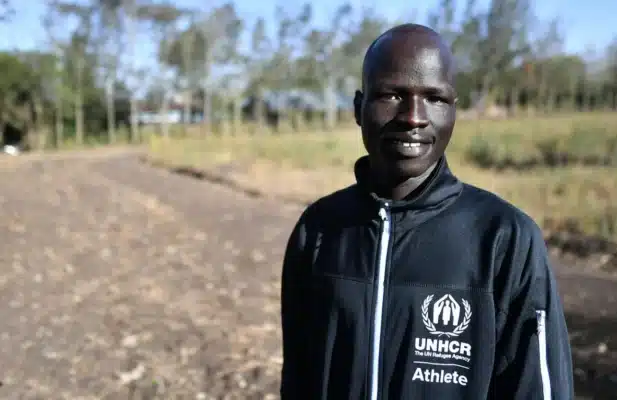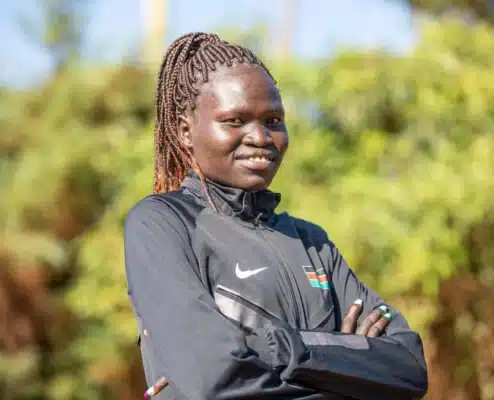
IOC Refugee Olympic Team member Yahya Bassam Al Ghotany. © IOC Media
Friends and family of Yahya Bassam Al Ghotany filled with pride as he competes in Paris, while the academy in Azraq camp where he trained helps young people build resilience and follow their dreams
By Rand Batarneh in Azraq refugee camp, Jordan, and Mel Paramasivan in Geneva, Switzerland
Some of the world’s most successful athletes start their careers in sports academies with hopes of turning their dreams of competing internationally into reality. In 2016, Yahya Bassam Al Ghotany stepped into The Taekwondo Humanitarian Centre (THC) in Jordan’s Azraq refugee camp after seeing other kids practising. Two years later he became the academy’s second black belt, and on Thursday he will compete at the Paris 2024 Olympics.
Al Ghotany is one of 37 remarkable athletes competing in Paris under the IOC flag and representing 120 million people who have been forcibly displaced worldwide. At the opening ceremony, the 21-year-old was a flagbearer for the IOC Refugee Olympic Team alongside boxer Cindy Ngamba, who in a historic fight on Sunday secured the team’s first-ever medal.
Al Ghotany’s family moved to Jordan when he was a young teenager and it was through sport that he made one of his closest friends there, Ali Al Sikmany.
“I met Yahya in 2015, and he was the first person I got to know in the camp and my very first friend there,” he says.
Arriving in a refugee camp is a daunting experience. Teenagers like Al Ghotany and Al Sikmany had to leave their homes and friends behind, unsure if they would ever see them again. Sport can help young refugees meet new friends and find a safe and supportive environment to help them overcome the challenges related to displacement.
“Yahya and I played various sports together, participated in the school football league. Once, we even participated in a Roman wrestling match!” Al Sikmany fondly recalls.
Al Ghotany’s mother, Tirfah Ahmad Ali Alsharea, remembers when he first showed an interest in the sport. “He used to go watch other kids practice taekwondo, then he decided to sign up and wanted to become a taekwondo athlete.”

A group of refugee girls take part in a training session at the Taekwondo Humanitarian Centre in Jordan’s Azraq refugee camp in April 2023. © UNHCR/Mohammad Alyounes
Taekwondo is a popular sport in refugee camps and settlements around the world, with UNHCR, the UN Refugee Agency, working in partnership with the Taekwondo Humanitarian Foundation (THF) to deliver social and competitive sport programmes.
The THF was founded by Dr Chungwon Choue, who is also the current President of World Taekwondo. He saw the potential for taekwondo to help young people build resilience and improve their physical and mental health.
“We have always said that Taekwondo is more than a sport: it is a philosophy,” explains Dr. Choue. “We therefore recognized that Taekwondo has immense potential to empower refugee athletes, not only helping them to stay active but also instilling in them skills and disciplines that will serve them off the mat. Taekwondo can inspire hope and provide the structure that is so crucially missing in the lives of these young refugees.”
“Since its creation, the THF has helped more than 13,000 refugees,” he continues. “We have seen first-hand the transformative impact Taekwondo can have on people’s physical and mental health and the joy and social cohesion it brings to communities. We are proud that young people like Yahya are inspiring millions around the world through Taekwondo and leading the way in raising awareness of the global refugee crisis.”
Al Ghotany’s family and friends will be watching him compete in Paris from Azraq camp today with a sense of joy and excitement.
As IOC @RefugeesOlympic Team athlete Yahya Al Ghotany takes the Olympic stage, his family in Jordan’s Azraq camp sends heartfelt messages of encouragement. #CheerForRefugees #Paris2024 pic.twitter.com/Mx6ZJu2Ait
— UNHCR, the UN Refugee Agency (@Refugees) August 8, 2024
“I feel immense pride and honor because he represents me, his family, and all refugees. I am proud of him for being an ambitious young man who has achieved his goals,” his friend Al Sikmany says.
Al Ghotany’s brother Zakaria sees his younger sibling as an inspiration to himself and others. “I am proud that my brother reached this level, and that his story makes one think about how he managed to achieve all of this despite all the challenges he faced, which makes him a role model. The lesson I learned from him is that nothing is impossible and the harder you work, the more you will achieve.”
Originally published by UNHCR on 8 August 2024.





